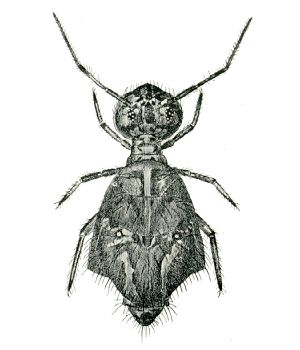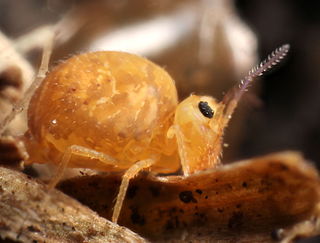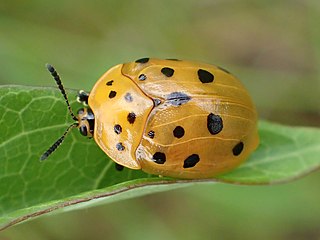
Spearmint, also known as garden mint, common mint, lamb mint and mackerel mint, is native to Europe and southern temperate Asia, extending from Ireland in the west to southern China in the east. It is naturalized in many other temperate parts of the world, including northern and southern Africa, North America, and South America. It is used as a flavouring in food and herbal teas. The aromatic oil, called oil of spearmint, is also used as a flavoring and sometimes as a scent.

Charadrahyla is a genus of frogs in the family Hylidae. It is endemic to tropical southern Mexico. The generic name was derived from Greek charadra ("ravine") and Hyla, in reference to the habits of these frogs. Accordingly, common name ravine treefrogs has been coined for the genus.

The Encyclopedia of Life (EOL) is a free, online encyclopedia intended to document all of the 1.9 million living species known to science. It aggregates content to form "pages" for every known species. Content is compiled from existing trusted databases which are curated by experts and it calls on the assistance of non-experts throughout the world. It includes video, sound, images, graphics, information on characteristics, as well as text. In addition, the Encyclopedia incorporates species-related content from the Biodiversity Heritage Library, which digitizes millions of pages of printed literature from the world's major natural history libraries. The BHL digital content is indexed with the names of organisms using taxonomic indexing software developed by the Global Names project. The EOL project was initially backed by a US$50 million funding commitment, led by the MacArthur Foundation and the Sloan Foundation, who provided US$20 million and US$5 million, respectively. The additional US$25 million came from five cornerstone institutions—the Field Museum, Harvard University, the Marine Biological Laboratory, the Missouri Botanical Garden, and the Smithsonian Institution. The project was initially led by Jim Edwards and the development team by David Patterson. Today, participating institutions and individual donors continue to support EOL through financial contributions.
Charadrahyla juanitae is a species of frog in the family Hylidae. It is endemic to Mexico. Its natural habitats are subtropical or tropical moist lowland forests, subtropical or tropical moist montane forests, and intermittent rivers. It is threatened by habitat loss.
Charadrahyla pinorum is a species of frog in the family Hylidae. It is endemic to the Pacific slopes of Sierra Madre del Sur between central Guerrero and southwestern and central Oaxaca, Mexico. Common names pine wood treefrog and Mexican pine woods treefrog have been proposed for it. Its closest relative is probably Charadrahyla juanitae.
Elipsocidae is a family of Psocodea belonging to the infraorder Homilopsocidea. Members of the family have a free areola postica. Many species are apterous. The family includes about 130 species in more than 30 genera.

Sminthuridae, not to be confounded with: Sminthurididae, is a family of springtails of the order Symphypleona. Sminthurids are commonly referred to as globular springtails.

Kateretidae also known as short-winged flower beetles are a family of beetles in the superfamily Cucujoidea. There are 10 extant and 4 extinct genera, and at least 40 described species. They are found worldwide except in New Zealand. Adults are anthophagous, feeding on flowers, while the larvae are spermatophagous inside the flower corolla.
Pygmaepterys juanitae is a species of sea snail, a marine gastropod mollusc in the family Muricidae, the murex snails or rock snails.

Pygmaepterys is a genus of sea snails, marine gastropod molluscs in the subfamily Muricopsinae of the family Muricidae, the murex snails or rock snails.
Anthene juanitae, the Juanita's hairtail, is a butterfly of the family Lycaenidae. It is found in South Africa (Limpopo). It is found in dense riverine vegetation along the Olifants River.

iNaturalist is an American 501(c)(3) nonprofit social network of naturalists, citizen scientists, and biologists built on the concept of mapping and sharing observations of biodiversity across the globe. iNaturalist may be accessed via its website or from its mobile applications. iNaturalist includes an automated species identification tool, and users further assist each other in identifying organisms from photographs and even sound recordings. As of 9 July 2024, iNaturalist users had contributed approximately 197,660,888 observations of plants, animals, fungi, and other organisms worldwide, and 290,007 users were active in the previous 30 days.
Bourletiella viridescens is a species of springtail. Its common name is "Garden Springtail"

Bourletiella hortensis is a springtail of the family Bourletiellidae. The species common name is garden springtail. It feeds on moss and fungi.

Bourletiellidae is a family of springtails in the order Symphypleona.
Pseudechiniscus is a genus of tardigrades in the family Echiniscidae. The genus was named and described by Gustav Thulin in 1911.

Chelymorpha cassidea, known generally as the Argus tortoise beetle or milkweed tortoise beetle, is a species of leaf beetle in the family Chrysomelidae. It is found in the Caribbean and North America.

Bourletiella arvalis is a species of globular springtails in the family Bourletiellidae.
Bourletiella rustica is a species of globular springtails in the family Bourletiellidae.
Animal Ethics is a nonprofit organization formed to promote discussion and debate around issues in animal ethics and to provide information and resources for animal advocates. They also do outreach work in several countries on the issue of speciesism. Their aim is to create a world where moral consideration is extended to all sentient beings. The organization's website covers topics such as speciesism, sentience, veganism and wild animal suffering and has content translated into several languages.










